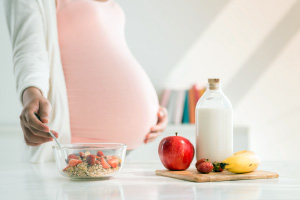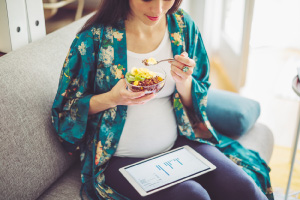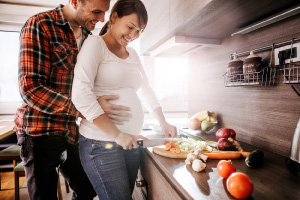A Quick Guide for Choosing the Right Foods During Pregnancy
Choosing the right foods during pregnancy can be tricky. At Northland Women’s Health Care, we help support healthy pregnancies through direct guidance, including diet plan suggestions.
In today’s post, we’ll cover food tips during pregnancy and the foods you should and shouldn’t eat during pregnancy.
The Best Foods to Eat During Pregnancy
 To get the right nutrients, you need to eat a mix of foods from different food groups:
To get the right nutrients, you need to eat a mix of foods from different food groups:
- Vegetables: broccoli, beets, okra, sweet potato, spinach, and tomatoes.
- Whole grains: brown rice, millet, oatmeal, bulgur, and whole-wheat bread.
- Low-fat or fat-free dairy: milk, Greek yogurt, cheese, lactose-free dairy, and soy yogurt.
- Oils: extra virgin olive oil, vegetable oil, oily foods like avocado, seafood, and nuts.
- Proteins: lean meat, eggs, low-mercury seafood, beans, lentils, nuts, seeds, and chicken.
- Whole fruits: bananas, oranges, apples, mangos, pineapples, and berries.
Which Foods Help Pregnancy Symptoms?
During the first trimester, there can be a lot of fatigue. Despite this, you should avoid energy drinks and caffeine. Eating protein-rich foods is essential before, during, and after pregnancy.
- Fatigue: eat spinach, peanut butter, or trail mix.
- Morning sickness: take ginger in any form.
- Heartburn: choose low-acidic foods like bananas.
- Constipation: eat fiber-rich foods like beans, berries, or broccoli.
- Sleeplessness: drink organic, non-caffeinated tea or warm milk.
How Many Calories Are Needed During Pregnancy?
- First Trimester: no extra calories needed.
- Second Trimester: increase by 340 extra calories per day.
- Third Trimester: increase to 450 extra calories per day.
If you need help deciding on lifestyle changes in conjunction with your eating habits, physical activity plans, or over-the-counter medications for your pregnancy, consult an obstetrician-gynecologist at NWHC.
Build a Pregnancy Meal Plan
A pregnancy meal plan can help you stay on target with your eating habits and maintain a balanced diet. A meal plan also frees up time and energy that would otherwise go toward finding new meals to cook.
 A quality meal plan should properly hydrate you and give you enough protein. Remember to include things like:
A quality meal plan should properly hydrate you and give you enough protein. Remember to include things like:
- Whole foods like lean protein, healthy fats, and fiber-rich carbohydrates
- Tons of vegetables and leafy greens
- Plenty of water (12 cups a day)
- Batches of freezer-prepped healthy meals for the next few months
- Add in some easy-to-reach snacks like nuts and dried fruit for when cravings hit
You can create your own pregnancy meal plan or download and follow a premade template online.
Foods that Pregnant Women Should Completely Avoid
While dairy products contain casein and whey, two high-quality proteins that are great for pregnancy, not all dairy products should be eaten.
Avoid raw or unpasteurized dairy products:
- Unpasteurized milk
- Unpasteurized semi-hard and soft cheeses
- Brie, chevre, feta, blue cheese, or camembert
- Liver or liver products
- All types of pate (uncooked, raw meat)
- Game meats like pheasant, dove, goose, or partridge
- Processed lunch meats, hot dogs, and cold cuts should be heated until steaming before consuming
- Undercooked, raw meat
- Sunny-side-up eggs, hollandaise sauce, or raw eggs
Avoid raw fish completely. Some fish, like white albacore tuna, swordfish, and big eye tuna, contain a high mercury content. Do not eat them.
Should I Take a Prenatal Vitamin?
Yes, a prenatal vitamin ensures that your baby has healthy development. Ideally, the bulk of your nutritional needs should come from your foods. But this can take a lot of work to achieve. That’s why a prenatal vitamin is so essential.
Which Vitamins and Minerals Do I Need?
 These are the most important vitamins that you’ll need:
These are the most important vitamins that you’ll need:
- Iron: important for carrying oxygen to your growing baby, lowering the risk of miscarriage, pre-birth delivery, anemia, stillbirth, and various birth defects.
- Iodine: helps with the neurological development of the fetus.
- Folic Acid: helps form the neural tube and prevents major birth defects.
- Vitamin D: improves fetal growth and reduces the risks for preeclampsia, preterm birth, and gestational diabetes.
- Vitamin C: helps to avoid preeclampsia, intrauterine growth restriction, and maternal anemia.
- B Vitamins: helps to develop the brain and nervous system of the baby.
- Vitamin K: helps reduce the risk of postpartum hemorrhage.
- Omega-3 Fatty Acids: helps baby's eye and brain growth and early development. It can lower your baby's chances of getting asthma and other allergic conditions.
- Calcium: prevents pre‐eclampsia and preterm birth and lowers the risk of a woman dying or having serious problems related to high blood pressure in pregnancy.
- Gelatin and Collagen: helps the baby’s organ and bone tissue development.
Iron-Rich Foods for Pregnancy
Iron is among the most important minerals you can have in your diet; the best sources of iron can be found in:
|
|
Choline-Rich Foods
Choline protects against neural birth defects. It’s incredibly important to incorporate foods that have plenty of choline. Eggs, dark leafy greens, spinach, Swiss chard, kale, and collards (also containing calcium, Vitamin K, and folic acid) help build a healthy blood supply, form the baby’s tissues, protect the baby’s DNA from methylation changes, and contribute to bone growth.
Beta-Carotene-Rich Foods
Your body uses beta-carotene to create vitamin A, which develops a baby's organs and skeletal system. Green, leafy vegetables and yellow or orange fruits and vegetables contain the most beta-carotene. The best foods to have that contain this include broccoli, carrots, sweet potato, spinach, and winter squash, all of which contain beta-carotene.
Foods with Healthy Fats
Eating vegetables with healthy fats like grapeseed oil, butter, ghee, or avocado oil helps the absorption of fat-soluble vitamins in your diet. Foods with healthy fats and fat-soluble vitamins include avocados, eggs, dark chocolate, nut butter, tree nuts, Greek yogurt, soybeans, extra-virgin olive oil, and fatty fish (salmon or black cod).
Benefits of Legumes, Beans & Lentils for Pregnant Women
These are a great source of folate, potassium, iron, magnesium, and essential fatty acids. They also have phytochemicals that protect against oxidative stress and inflammation and improve pregnancy outcomes in general.
Benefits of Eating Nuts and Seeds During Pregnancy
They contain protein, magnesium, healthy fats, vitamin E, folate, and fiber. Fiber helps digestion. Healthy fats will protect your baby's brain development.
Benefits of Lean Meat During Pregnancy
Lean meats are great for protein, but the bones, skin, and connective tissue that you get from the meat on the bone, or bone-based broth that contains a high amount of collagen, gelatin, calcium, magnesium, iron, and zinc.
Best Food to Eat While Breastfeeding
 The healthiest food you can eat while breastfeeding remains the same as the healthy food you eat while pregnant. It’s good to remember that your food gets passed to your baby through your milk. So, avoid excessive coffee, soda, and alcohol.
The healthiest food you can eat while breastfeeding remains the same as the healthy food you eat while pregnant. It’s good to remember that your food gets passed to your baby through your milk. So, avoid excessive coffee, soda, and alcohol.
Best Food to Eat Post-Pregnancy
After spending the last nine months eating enough food for two, what’s the best food to eat after giving birth? Typically, the best post-pregnancy foods should be high in protein.
Foods that are rich in protein sources include:
- Seafood (salmon)
- Lean meats
- Eggs
- Soy products (tofu, tempeh, soy milk)
Schedule an Appointment at Northland Women’s Health Care in Kansas City, MO
If you’re looking for help during your pregnancy journey, our staff of experienced women’s health practitioners in North Kansas City, Missouri, can help. Contact us to schedule your first appointment today.
